Install this application on your home screen for quick and easy access when you’re on the go.
Just tap then “Add to Home Screen”
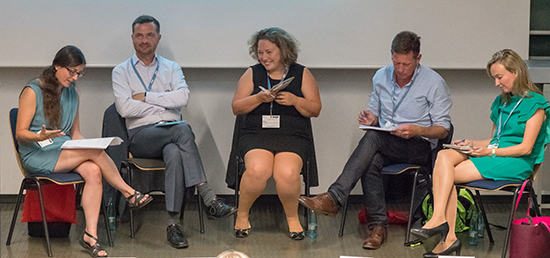 Many of us care about teaching.
Many of us care about teaching.
We invest in developing good courses, staying up to date with innovative teaching methods, and redesigning course materials to reflect new scholarly research.
But what role does (good) teaching play in advancing the academic (career) path of political scientists?
How can we take teaching seriously, and still ensure there is enough time for research and publishing?
How to be serious about caring about students, while not having to carry the burden on working overtime constantly?
During this Roundtable on 23 August at ECPR's 2018 General Conference in Hamburg, we invited four academics with different national higher education backgrounds to discuss the role teaching could and should play in our academic self-understanding.
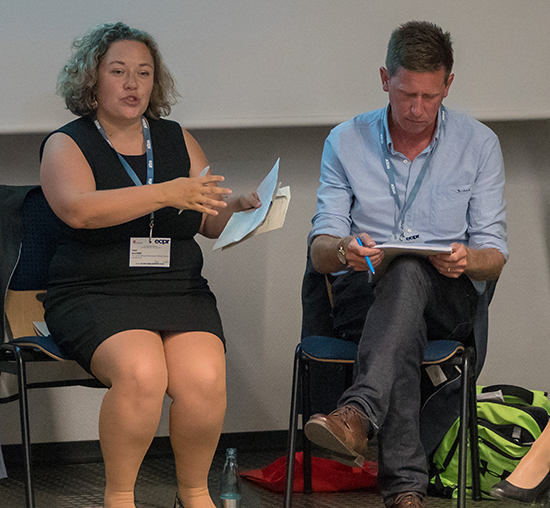 Speakers
SpeakersChair Heidi Maurer London School of Economics and Political Science
First, the panel reflected on their own experiences on what role teaching does and should play in their national and institutional contexts, and how they learnt to teach and innovate. The interventions highlighted the importance of personal experiences for their commitment to teaching: 'I was taught well, and that is why I want my students to learn well' (Ian). Early opportunities to co-teach with more experienced professors can be an insightful first way to learn and observe (Ariadna).
In some environments, teaching and reflecting on one's teaching can be a lonely activity and without formal exchange opportunities. Engaging and looking for opportunities to get feedback and inspiration through professional networks can help in these cases.
We want our students to take ownership of their learning, and as academics we also can take ownership for being good and inspiring instructors. Getting started might often feel painful, but learning by mistakes is normal. It is important that departments provide this room for experimentation (Petr).
All universities now have some kind of teaching and learning support unit, but studies also show that they are not a suitable means to improve what academics do in the classroom. Ian recommends a reflective, hands-on approach: there are great resources out there, which one can use to get inspired (check pedagogical literature but also YouTube featuring, for example, Ken Robinson or Eric Mazur). But also we should time and again reflect on our own practice: 'go and tape your lectures, and then watch them'.
All panellists share a common understanding in their suggestions: as an academic community we should care about teaching, but one also needs to be smart, especially at the beginning of one's academic career: promotions are guided by research output. Or as one panellist put it: 'an excellent teaching record can get you the foot in the door like an interview, but alone it will not get you the job'.
The amount of teaching varies considerably between national contexts (Karolina), and especially for the first jobs after PhD, junior colleagues are advised to check carefully for teaching loads but also group sizes to be taught in order to compare possible vacancies. The amount of teaching-only contracts is increasing, and if one has a choice, it is always better to go for a vacancy that allows one to combine as much research (and possibility for publishing) as possible.
In a second round we took a broader perspective and discussed the position of teaching in European higher education and universities. Again, the issue of precarious teaching jobs was high on the agenda. The panel emphasised that often respective colleagues simply do not have a choice, and that this is also where it needs our whole community and profession to take responsibility: collegiality and solidarity are important to ensure that higher education evolves in a way that does not further split up our community.
The problem is also that 'universities often do not know how to care about teaching', and that is also where our community can step in and take responsibility to shape the discourse.
Evaluations measure all kinds of things but surely not the learning process of our students. They are often just a management tool that does not measure what we as educators would want or need to know. Quality assessment is not necessarily bad, as it brings accountability, but it depends how it is done. We as educators but also as managing academics must not buy into superficial discourse and can also do more to question the reliability and validity of such tools.
Peer assessment should be used to have conversations, not rank each other; and we should all dare to use our networks much more strongly to get support for teaching, learn from each other, but also to show solidarity.
The aim of the Roundtable was not to come up with definite answers, but to provide an impetus for a more open and supportive discussion on our role as educators in higher education. We hope that many more such discussions will follow that create the necessary collegiality and solidarity from which we can all profit.
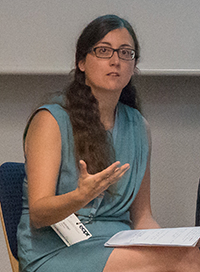 Ariadna Ripoll Servent
Ariadna Ripoll Servent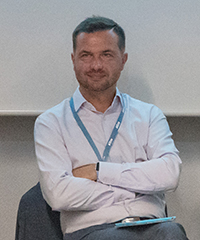 Petr Suchý
Petr SuchýDo not get too frustrated if you do not see the immediate fruits of your teaching. Teaching is an interactive process and there is not one quick fix for all kinds of teaching situations. Do not be afraid to learn from mistakes.
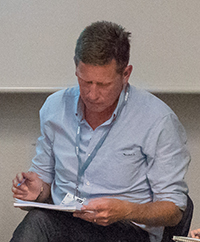 Ian Manners
Ian Manners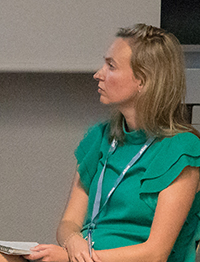 Karolina Pomorska
Karolina Pomorska
A big thanks to our panellists for sharing their experiences and insights!